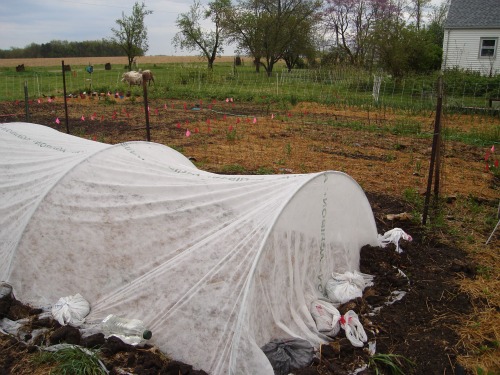 Steph Larsen’s digital farm plan takes shape in the material world.Photo: Steph LarsenWhat’s black and white and dirty all over?
Steph Larsen’s digital farm plan takes shape in the material world.Photo: Steph LarsenWhat’s black and white and dirty all over?
My garden plan! Last year’s was, anyway.
Most farmers I know will say that keeping good records and plans is fundamental to farming success. By no means am I what you might call a natural planner — I lean towards the “organized chaos” style of living. But when it comes to growing things, I’m convinced that adding a healthy dose of order to the garden chaos is a necessity. There are just too many variables to consider otherwise.
Garden plans don’t have to be fancy, and last year mine was on old fashioned graph paper with pencil. By the end of the season I had a muddy, smudged mess with so much text squeezed in that it was illegible. I’d left it out in the rain a time or two, which didn’t help matters any. For 2011, I was looking for something computer-based and easy to use.
Enter the garden planner from Mother Earth News.
While far from perfect, this planner is a pretty decent tool with many useful features I’ve quickly found invaluable. For example, if I want to plant tomatoes, it graphically tells me how many I can plant in a given bed. No more endlessly looking up distances on seed packets! And knowing how many plants I could fit in a space was incredibly helpful when we started seedlings indoors in March.
Timing is also critical for a successful garden — knowing which seeds germinate in cooler soils and which like it warmer, or how long after planting can you expect to harvest. When starting this garden planner, one of the first things I did was enter my zip code. Immediately the planner estimates frost dates, and for every plant I’ve plotted it tells me on an easy to read graph when I should plant it inside and outside and when I can expect to harvest. Suddenly a weekend’s worth of tasks is laid out without having to lift a finger, and you can even buy seeds from several different seed companies directly through your plan.
And that’s not all — twice a month, I get an email reminding me what I should be planting in the subsequent two weeks.
Another cool feature of this planner doesn’t show itself until the second year of use. I drew my 2010 garden plan into the system this past winter, and when I started my 2011 plan, it already knew where permanent strawberry plans were and where I had my paths. When I clicked on a tomato to “plant” it, red zones immediately popped up telling me where I’d planted tomatoes, peppers, eggplants, and potatoes last year — reminding me to rotate in order to break up disease and pest cycles.
And each plant icon comes fully equipped with much of the information you need to grow it successfully — soil type, plant family, and spacing for example. I would have liked to see ideal soil temperature for germination too, but maybe that just shows how nerdy I am.
Like any tool, there are aspects of this one I’m not crazy about. The drawing tools aren’t very robust, so I spent several hours at first trying to get all the boxes and paths the way I wanted them. Often it was easier to erase a feature and start over rather than try to change its characteristics.
While the plant list is large, there were a few missing — mizuna and broccoli raab immediately come to mind, and it doesn’t allow for combinations like my spicy salad mix. I also ran into a problem with varieties of a crop. Take radishes as an example — there are small red salad radishes, icicle-shaped daikons, and the increasingly popular turnip-sized “watermelon” radishes. Spacing is going to be substantially different for each, but the graphics don’t allow me to specify large or small varieties.
I also have lingering questions about the back-end design of the program. I know precious little about these things, but I have yet to determine whether I can export my plan as a graphic and save it to my computer. The entire program appears to these extremely novice eyes to be driven off Flash and Java, which means it lacks a lot of the functions I’m used to when navigating other websites.
Did I mention it costs $25 a year? That amount is worth it to me, but part of that value is the continuity from year to year. What if Mother Earth News chooses to discontinue the garden planner? I might be completely out of luck.
But until then, I’m pretty happy with my neat, organized garden plan. Now if only my garden actually looked as perfect in real life as it does in its digital version!


